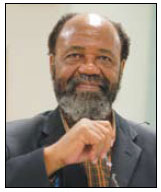Servicios Personalizados
Articulo
Indicadores
Links relacionados
-
 Citado por Google
Citado por Google -
 Similares en Google
Similares en Google
Compartir
SAMJ: South African Medical Journal
versión On-line ISSN 2078-5135
versión impresa ISSN 0256-9574
SAMJ, S. Afr. med. j. vol.100 no.11 Pretoria nov. 2010
FROM THE EDITOR
Millennium development goals: how are we doing?
At a global summit held in the year 2000, world leaders committed themselves to strive for the attainment by 2015 of a set of 8 far-reaching developmental mileposts known as the Millennium Development Goals (MDGs). Unlike previous global agreements (for example, the Alma Ata 'Health for All by the Year 2000' declaration), the MDGs were specifically tied to numerical benchmarks consisting of 21 quantifiable targets measured on the basis of 60 indicators. Goals 4 - 6 specifically target health issues, respectively to reduce child mortality, improve maternal health, and combat HIV/AIDS, malaria and other diseases. However, the rest of the goals (eradicate poverty and hunger; achieve universal primary education; promote gender equality; ensure environmental sustainability) are also inextricably tied to improved health outcomes.
The MDGs are the most broadly supported, comprehensive and specific development goals the world has ever agreed upon and, according to the UN Development Programme, great progress has already been made globally at the midpoint in the MDG timeline, although sub-Saharan Africa lags far behind other world regions. With the possible exception of South Africa and Zambia, most of the sub-Saharan countries are not on track to make the MDG deadlines, even though the goals remain achievable within these nations' means and circumstances.
South Africa has, by all accounts, made impressive progress in respect of some MDGs. Since 1994, extreme poverty (subsistence on less than $2 a day) has been halved, largely through exponential growth in cash transfers in the form of social assistance grants and in the number of beneficiaries. It must be said, however, that such handouts cannot be the ideal response to poverty. Ultimately, increased social upliftment including greater employment opportunities and more equitable wealth distribution remains the only durable solution. Government has greatly expanded access to all sorts of services since 2000. According to the 2009 General Household Survey, 83% of South Africans had electricity connection (with wide provincial and urban/rural disparities). The number of households with access to safe water exceeds 80%.
Since 1994, South Africa has seen massive shifts of resources to the education sector, making education the single largest budget item, itself among the highest allocations in the world as a proportion of the GDP. Remarkably in the context of the developing world, girls outnumber boys in secondary education, and already by 2001 the female-to-male ratio in higher education had risen to 115:100 (although this ratio drops off significantly at master's and doctoral levels). Former RDP minister Jay Naidoo says 'We've made tremendous progress in access to education but most of our schools in rural areas are dysfunctional ... It's not about access, it's about the quality of education.'1
A crisis of professionalism and stewardship
South Africa has not done nearly as well in respect of MDGs for health. In some ways, the country has taken two steps back. According to UNICEF,2 South Africa is one of only 12 countries in which child mortality rates have actually increased - from 56 in 1990 to 67 in 2008, with 27% of those who survive suffering from stunting. By some reports, the maternal mortality ratio stands at an astounding 400 per 100 000 live births (compared with, say, 210 for Ghana, 160 for Brazil).
Over 90% of birthing women in South Africa are attended by a health professional, so why are so many mothers dying in childbirth? The single most important factor is people. Money is important; health workers must have the wherewithal to carry out their functions. But ultimately a health system is only as good as those who serve in it. Health workers need to be dedicated, caring and respectful of the sanctity of life, and good outcomes depend on the heart of the provider being in the right place, as was amply demonstrated in the performance of the often impoverished mission hospitals of yore. In the past two decades we have seen a deepening erosion of the sense of call and duty of care among the health professionals in the public health system. As became painfully obvious during the recent public service workers strike, the attitudinal distinction between those who produce goods and services and those who care for people in distress has become regrettably blurred.
South Africa has a relatively strong national policy on safe motherhood, and excellent curricula for training health care providers. The problem lies in failure of stewardship - the failure of government to hold to account those who provide essential services and to ensure that health, education and other systems are managed so as to deliver quality services with quantifiable quality assurance indicators.
Until the government gets its management act together, and the health professionals return to the Hippocratic dictum primum non nocere - first do no harm, we are not going to see a turnaround in the MDGs for health any time soon.

Daniel J Ncayiyana
Editor
1. Black Sash. South Africa's Progress on MDGs Questioned - IPS Inter Press Service, 20 September 2010. www.blacksash.org.za/index.php?option=com_content&views=article&id=2438&catid=3&Itemid=39 (accessed 3 October 2010). [ Links ]
2. South Africa: Statistics. www.unicef.org/infobycountry/southafrica_statistics.html (accessed 3 October 2010) [ Links ]














